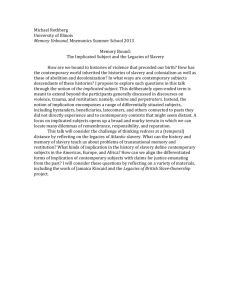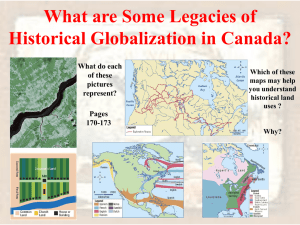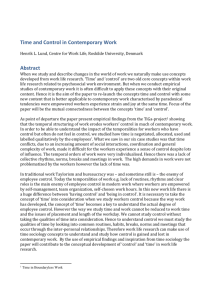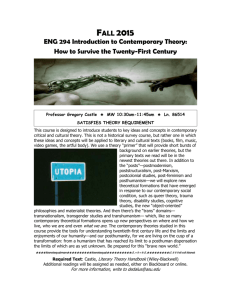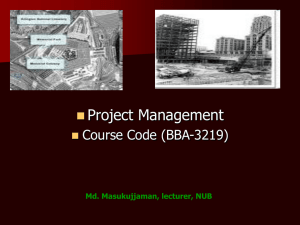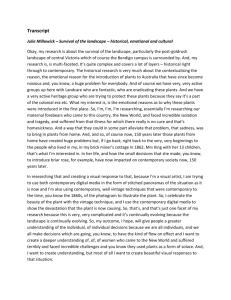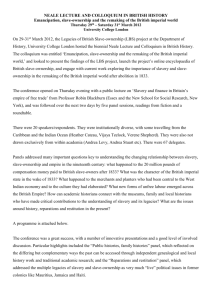Reparative Histories: Radical Narratives of `Race`
advertisement
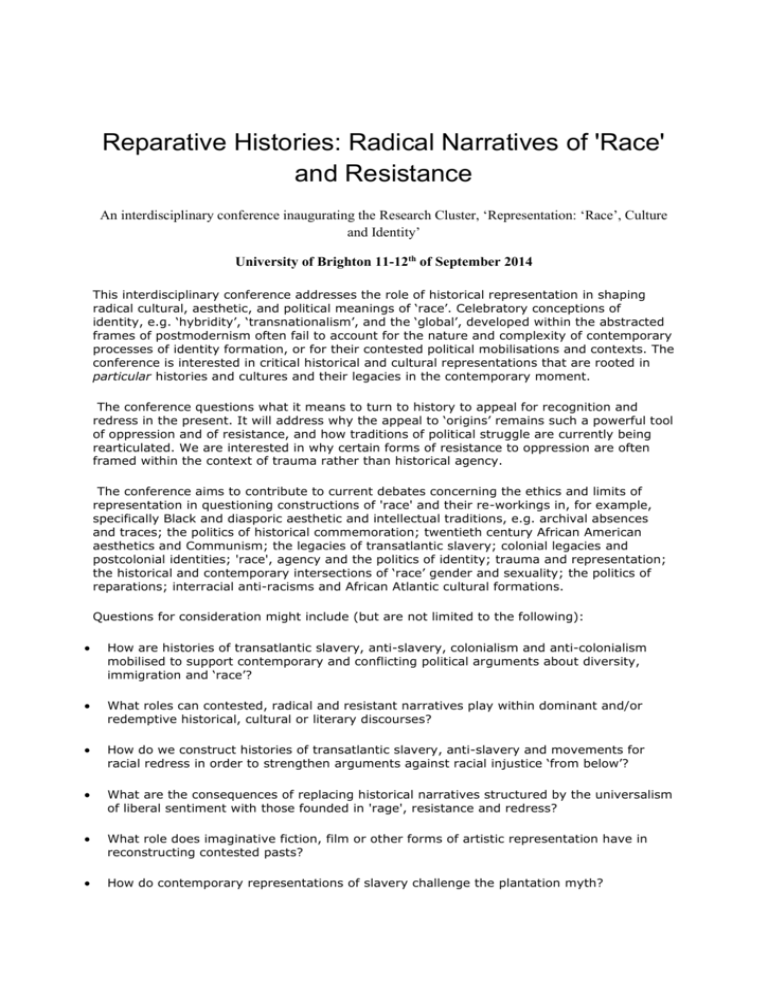
Reparative Histories: Radical Narratives of 'Race' and Resistance An interdisciplinary conference inaugurating the Research Cluster, ‘Representation: ‘Race’, Culture and Identity’ University of Brighton 11-12th of September 2014 This interdisciplinary conference addresses the role of historical representation in shaping radical cultural, aesthetic, and political meanings of ‘race’. Celebratory conceptions of identity, e.g. ‘hybridity’, ‘transnationalism’, and the ‘global’, developed within the abstracted frames of postmodernism often fail to account for the nature and complexity of contemporary processes of identity formation, or for their contested political mobilisations and contexts. The conference is interested in critical historical and cultural representations that are rooted in particular histories and cultures and their legacies in the contemporary moment. The conference questions what it means to turn to history to appeal for recognition and redress in the present. It will address why the appeal to ‘origins’ remains such a powerful tool of oppression and of resistance, and how traditions of political struggle are currently being rearticulated. We are interested in why certain forms of resistance to oppression are often framed within the context of trauma rather than historical agency. The conference aims to contribute to current debates concerning the ethics and limits of representation in questioning constructions of 'race' and their re-workings in, for example, specifically Black and diasporic aesthetic and intellectual traditions, e.g. archival absences and traces; the politics of historical commemoration; twentieth century African American aesthetics and Communism; the legacies of transatlantic slavery; colonial legacies and postcolonial identities; 'race', agency and the politics of identity; trauma and representation; the historical and contemporary intersections of ‘race’ gender and sexuality; the politics of reparations; interracial anti-racisms and African Atlantic cultural formations. Questions for consideration might include (but are not limited to the following): How are histories of transatlantic slavery, anti-slavery, colonialism and anti-colonialism mobilised to support contemporary and conflicting political arguments about diversity, immigration and ‘race’? What roles can contested, radical and resistant narratives play within dominant and/or redemptive historical, cultural or literary discourses? How do we construct histories of transatlantic slavery, anti-slavery and movements for racial redress in order to strengthen arguments against racial injustice ‘from below’? What are the consequences of replacing historical narratives structured by the universalism of liberal sentiment with those founded in 'rage', resistance and redress? What role does imaginative fiction, film or other forms of artistic representation have in reconstructing contested pasts? How do contemporary representations of slavery challenge the plantation myth? How do we account, historically, for the case that there has been a recent burgeoning of public memorialisation of slavery at the same time as increasingly conservative public discourse about racial justice? How have the intersections of ‘race’, class, gender and sexuality within historical and contemporary labour struggles been theorized and/or represented? How might historical chronologies defined by forgetting, absence or denial be disrupted through aesthetic, theoretical, or conceptual intervention. How do we further specify and conceptualise the ‘legacies’ of imperialism, colonialism and slavery? Does the term ‘legacy’ help or hinder an understanding of the relations between the past and the present? What is, or what might be, the shape of reparative history? Confirmed keynote speakers: Dr Priyamvada Gopal (University of Cambridge), and Dr Brian Kelly (Queen’s University, Belfast). We invite proposals from across the disciplines. They may concern historical and/or contemporary issues or moments and address any representational form. We welcome proposals for single papers, panels, or for plenary discussions. (Please provide a brief rationale for a panel or a plenary.) If your proposal speaks to one of the conference questions listed above, please specify this in your submission. Postgraduate submissions are of course welcome. Proposals of 250 words and a brief biography/CV should be sent to Anita Rupprecht (A.Rupprecht@brighton.ac.uk) and Cathy Bergin (C.B.Bergin@brighton.ac.uk). Closing date for proposals: 7th July 2014 The conference fee is £90. There is a fee of £45 for graduate students and for those with no institutional affiliation. The conference will be held at the Grand Parade Campus, University of Brighton on September 11th & 12th 2014
